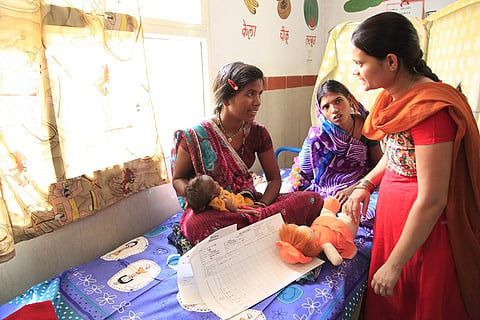

Despite the ever-growing body of evidence that breastfeeding saves lives, fewer than half of all new-borns are put to the breast within the first hour of life, says Ted Chaiban, Director of Programmes at the UNICEF, in his foreword to a global report that was published to encourage breastfeeding.
According to this report, almost 77 million new-borns are denied the basic right to their own mother’s breastmilk. The report reiterates the widely-held belief that breastfeeding in “the first hour of life” safeguards infants from dying at the “most vulnerable time in their lives”. It is in this hour that the new-born needs to make the “first critical contact” with the mother, outside the safety of the maternal womb.
The report views breastfeeding as a shared community effort, and not some sort of a job that is restricted to the new mom alone. Society including the government, public health system, workplaces, families and the community as a whole need to step in to ensure every new-born is breastfed by the mother. This, UNICEF says, will go a long way in carving out a better world for the coming generations.
Exclusive breastfeeding i.e. feeding infants only breastmilk for the first six months is said to be the safest and healthiest option for new-borns, says the report. Continued breastfeeding from six months to two years and above is said to improve cognitive ability, academic performance, productivity, and even positively impact long-term earnings.
Quoting from the report: “What and how children are fed –particularly in the first two years of life- is critical to their health, development and survival…..as children thrive, nations prosper; good nutrition drives human capital, lifts families out of poverty, and paves the way for a more sustainable future.”
Early introduction to a solid diet can also cause early cessation of breastfeeding and increased chances of infection, while a delayed introduction can lead to possible undernutrition in infants.
Global statistics reveal that the rate of continued breastfeeding is highest among women from impoverished backgrounds. And the sad reality is that we live in a world where the majority are deprived of a daily healthy diet.
Globally, only one in six children, are said to benefit from a minimum acceptable diet. Emphasis is also laid on the role of the caregivers in feeding the child, which is as important as the nature of food given to infants/toddlers.
The report talks about the importance of safe food preparation, storage and hygienic practices that is crucial for prevention of spread of diseases, and essential for ensuring that a good nutrition bears the desired results in growing children.
Even though the past decade has witnessed a global reduction in chronic malnutrition, the report claims that a whopping 156 million children under five years of age exhibit stunted growth.
The adoption of the 2030 Agenda for Sustainable Development aims to “end hunger, poverty, achieve food security, improve nutrition and health, ensure quality education and sustainable consumption, and promote gender equality.”
Both the UNICEF and the World Health Organization (WHO) have collaborated to invest in a Global Breastfeeding Advocacy Initiative that comprises a partnership between 18 global organizations.
This is part of their renewed global efforts to improve complementary feeding practices that resulted in the ‘First Foods’ Global Meeting that was held in India in 2015.
The said report provides a “global status update on infant and young child feeding practices”, while also putting forth recommendations for further improvement in the same.